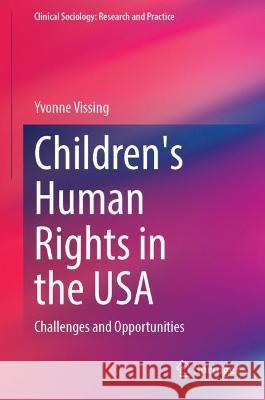Children's Human Rights in the USA: Challenges and Opportunities » książka
Children's Human Rights in the USA: Challenges and Opportunities
ISBN-13: 9783031308475 / Angielski
Children's Human Rights in the USA: Challenges and Opportunities
ISBN-13: 9783031308475 / Angielski
(netto: 573,71 VAT: 5%)
Najniższa cena z 30 dni: 578,30
ok. 22 dni roboczych.
Darmowa dostawa!
This book critically examines why a human rights framework would improve the wellbeing and status of young people. It explores children’s rights to provision, protection, and participation from human rights and clinical sociological perspectives, and from historical to contemporary events. It discusses how different ideologies have shaped the way we view children and their place in society, and how, despite the rhetoric of children's protection, people under 18 years of age experience more poverty, violence, and oppression than other group in society. The book points to the fact that the USA is the only member of the United Nations not to ratify a children’s human rights treaty; and the impact of this decision finds US children less healthy and less safe than children in other developed countries. It shows how a rights-respecting framework could be created to improve the lives of our youngest citizens – and the future of democracy.Authored by a renowned clinical sociologist and international human rights scholar, this book is of interest to researchers, students, social workers and policymakers working in the area of children's wellbeing and human rights.
This book critically examines why a human rights framework would improve the wellbeing and status of young people. It explores children’s rights to provision, protection, and participation from human rights and clinical sociological perspectives, and from historical to contemporary events. It discusses how different ideologies have shaped the way we view children and their place in society, and how, despite the rhetoric of children's protection, people under 18 years of age experience more poverty, violence, and oppression than other group in society. The book points to the fact that the USA is the only member of the United Nations not to ratify a children’s human rights treaty; and the impact of this decision finds US children less healthy and less safe than children in other developed countries. It shows how a rights-respecting framework could be created to improve the lives of our youngest citizens – and the future of democracy.











